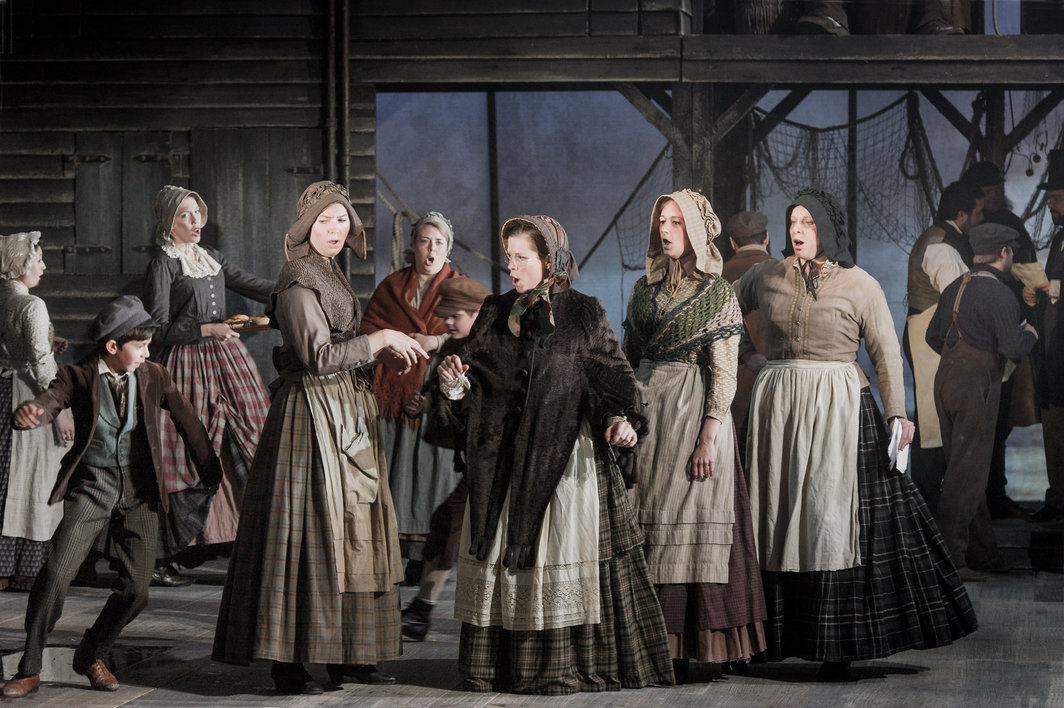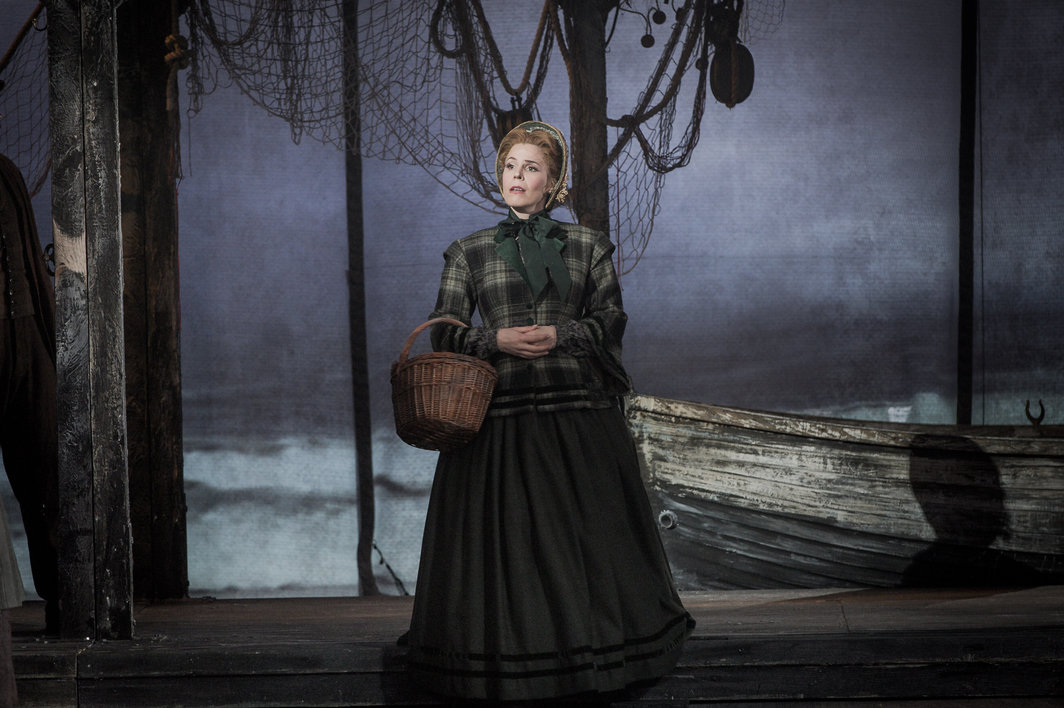It takes a brave opera company indeed to stage Peter Grimes this summer. Benjamin Britten’s 2013 centenary celebrations took us to “peak Britten”, with performances of all his major works as well as the unprecedented, outstanding Grimes on the Beach. Then, this January, David Alden’s production of the opera returned to the Coliseum: direct, theatrical and if anything more potent than five years before. How then, could Grange Park – a David to the Goliaths of the Aldeburgh Festival and ENO – possibly compete?
The answer, in Jeremy Sams’ quietly inventive production, is very well. Sams takes us back to poet George Crabbe’s 19th-century Borough rather than Britten’s 20th-century Aldeburgh. Among bonnets and wicker baskets, beards and fishing boats, and framed in the stern wooden embrace of the docks, the confinement and uncomfortable intimacy of these lives come back into focus.
Peter Grimes is the ultimate operatic ensemble piece, and Grange Park deliver quite the ensemble
Francis O’Connor’s designs give us stylised realism – a digital ocean rolling at the back of the stage, a simple, flexible set that opens up gradually to let us peer behind the bleak facades and into church, home and hut. If it’s all a little too clean, a little too euphemistic a visual treatment of this harsh coastal life, then Sams’ direction steps in to rub a little dirt on its face.
The Sea Interludes become the basis for a sequence of flashbacks that show us the young Peter and Ellen as children. We see Peter, already an outcast, attempt to break free from an abusive and alcoholic guardian, beaten violently at one point, at another sneaking a drink from the passed-out man’s hip-flask. Too often Ellen’s unshakeable devotion to the gruff, unfriendly Peter seems implausible, built on nothing, so to fill in these childhood blanks does help. It does however risk turning into an extended apologia for Grimes – demanding sympathy that Britten’s writing might provoke but never asks.
There’s an elegance to this cycle of violence of old against young, where a larger question of the role of fathers (absent and otherwise) is raised as well as some topical issues about the nature of abuse. “Home! Do you call that home?” shout the chorus of Grimes’s hut – a question that’s a long way from being rhetorical here, and all the more interesting for that.
 Peter Grimes is the ultimate operatic ensemble piece, and Grange Park deliver quite the ensemble. When you have the wonderful Clive Bayley in the (very) supporting role of Swallow, it sets the tone for some very fine singing. Stephen Gadd’s Balstrode is bluffly personable, making free with Britten’s recitative to pleasing effect. He’s matched by Gary Griffiths – a Ned Keene with a twinkle in his eye as well as a pill in his pocket – and is if anything outdone by Andrew Rees’s superbly-sung Bob Boles, delivered at a sustained pitch of righteous hysteria.
Peter Grimes is the ultimate operatic ensemble piece, and Grange Park deliver quite the ensemble. When you have the wonderful Clive Bayley in the (very) supporting role of Swallow, it sets the tone for some very fine singing. Stephen Gadd’s Balstrode is bluffly personable, making free with Britten’s recitative to pleasing effect. He’s matched by Gary Griffiths – a Ned Keene with a twinkle in his eye as well as a pill in his pocket – and is if anything outdone by Andrew Rees’s superbly-sung Bob Boles, delivered at a sustained pitch of righteous hysteria.
Rebecca de Pont Davies (last seen as Auntie in ENO’s Grimes) undergoes a transformation here to re-emerge as a crazed Mrs Sedley, relishing her “Murder most foul” with disturbing glee. Anne-Marie Owens’ Auntie, however, lacks anything of the character Davies found in her, the role sitting too low for Owens’s voice ever to flourish freely. The quartet rocked a little, never quite settling into that harmonic certainty that this rare moment of female alliance suggests.
 At the core of the action are Georgia Jarman’s Ellen (pictured left) and Carl Tanner’s Grimes – a pair of thwarted lovers as believable as any we’ve seen in the UK of late. Tanner, suffering from sinusitis, was fighting to deliver – a struggle only really evident in softer sections. Once compelled into the demands of “Now the Great Bear” or the mad scene, his muscle memory seemed to kick in and carry him through. Dramatically Tanner is an effective Peter – never tender, even for a moment, but interestingly damaged. Jarman’s Ellen was beautifully sung. The soprano’s voice is a rounded, glossy affair – perhaps almost too youthful and healthy for a role that needs suffering and struggle as much as it needs beauty.
At the core of the action are Georgia Jarman’s Ellen (pictured left) and Carl Tanner’s Grimes – a pair of thwarted lovers as believable as any we’ve seen in the UK of late. Tanner, suffering from sinusitis, was fighting to deliver – a struggle only really evident in softer sections. Once compelled into the demands of “Now the Great Bear” or the mad scene, his muscle memory seemed to kick in and carry him through. Dramatically Tanner is an effective Peter – never tender, even for a moment, but interestingly damaged. Jarman’s Ellen was beautifully sung. The soprano’s voice is a rounded, glossy affair – perhaps almost too youthful and healthy for a role that needs suffering and struggle as much as it needs beauty.
As in any good production of Grimes however, the chorus are the stars here. The small auditorium gives a dangerous intensity to their cries, and some subtle choreography and individual characterisation makes the mob scene particularly potent. It’s just a shame then that among so much intensity Stephen Barlow’s conducting keeps things so matter-of-fact throughout, generating energy, but never quite daring to linger and let the music do its work.
It may be a year late, but as Britten tributes go Grange Park’s Peter Grimes is up there with the big boys.
- Peter Grimes is at Grange Park until 21 June















Add comment